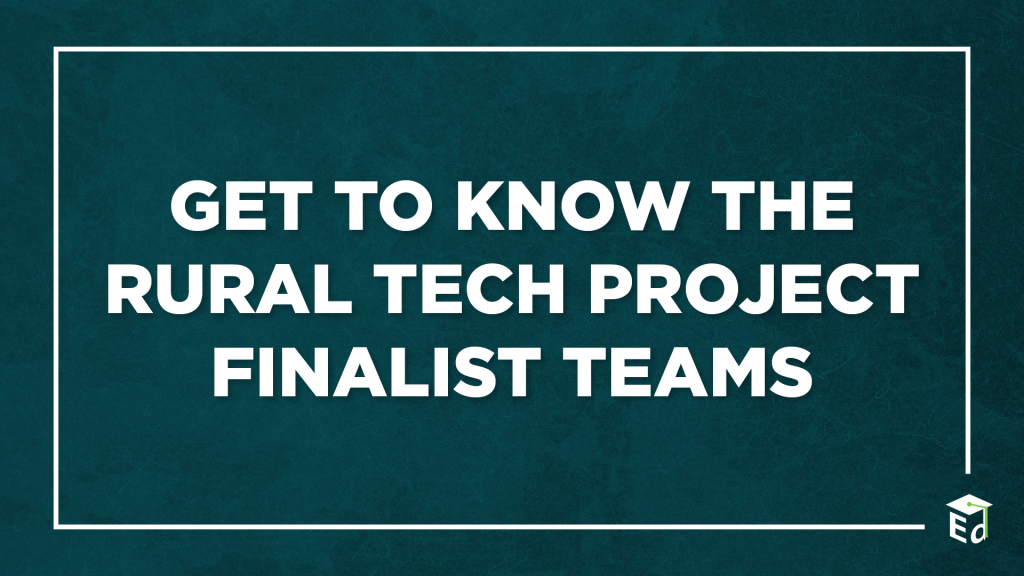[ad_1]

One-third of American schools are located in rural areas. We want to ensure rural students have every opportunity to pursue careers in their communities and local regions — as well as in our increasingly complex global labor market. To that end, ED launched the Rural Tech Project, a $600,000 challenge to advance technology education and prepare students for the careers of today and tomorrow.
In 2020, ED invited high schools and local educational agencies to propose technology education programs that use competency-based distance learning. The challenge received 63 proposals, and five finalist teams advanced to the second phase. Each finalist team received $100,000 and on-the-ground assistance to implement their programs for two years. This July, the teams traveled to the White House to present their programs and share lessons learned.
The Rural Tech Project interviewed the teams to understand their impressive program outcomes and advice for other schools — especially as they look ahead to the sustainability and scaling of their work.
The teams are readying students with the transferable technology skills they need for in-demand, rewarding careers. Several of the programs enable students to acquire industry certifications and college credits. Woodlake’s Aviation Pathway prepares students for regional aviation careers and postsecondary degrees. Students earn dual-enrollment credits from a local community college and can even earn an FAA drone operator license to practice their skills in real-life applications.
- iLEAD Academy in Carrollton, Kentucky — How iLEAD is eliminating barriers to computer science education
- Louisa County Public Schools in Mineral, Virginia — How Louisa is preparing students for high-impact cybersecurity careers
- Premont Independent School District in Premont, Texas — How Premont is blending technology education with entrepreneurship
- Ravenna Public Schools in Ravenna, Michigan — How Ravenna is rethinking agricultural technology education
- Woodlake High School in Woodlake, California — How Woodlake is empowering students with aviation skills and credentials
Local solutions for local needs
The five programs are notably distinct, addressing the workforce demands of their local communities. iLEAD recognizes that on any given day in Kentucky, there are about 3,500 computer science jobs open. The team’s dual-credit program is addressing this skills gap by offering opportunities to earn industry certifications and creating accelerated pathways to computer science degrees.
“That really is our secret sauce at iLEAD — how we wrap services around kids to be able to accomplish that. More than three-quarters of iLEAD’s graduates earned an associate degree. We provide access to kids who would not have had access any other way.”
— Alicia Sells, Director of Innovation & Communication at Ohio Valley Educational Cooperative
Powerful industry and community engagement
With extensive partner engagement, finalist teams have supported their educators with more resources and expanded program offerings. Louisa’s cybersecurity program prepares students to enter the workforce with industry credentials or pursue postsecondary programs. Students have access to work-based learning opportunities, and regional industry partners share insight into how skill development aligns with employer needs.
“Work-based learning has gone from a plan of action to actual implementation. Students are excited about the outside opportunities we have, and it’s gone from a little bit of interest to this mass amount of interest for all of our students.”
— Crystal Torbush, Cybersecurity Instructor at Louisa County High School
Flexibility to adapt and iterate
In reflecting on their program successes, teams stressed the importance of remaining flexible, especially when it comes to delivery methods. Premont, in collaboration with the Rural Schools Innovation Zone (RSIZ), has a capstone program for students to create technology-enabled solutions that can solve community challenges — from wildfire mitigation to healthcare access. The team emphasized the willingness to iterate as they utilized both distance learning and in-person experiences.
“It’s OK to pivot. If your plan doesn’t work exactly the way you think it’s going to work, it’s OK to change it and adapt. I think we had better success in year two because we were willing to pivot.”
— Shane Thomas, Co-founder and Chief Program Officer of CareerCraft, a RSIZ partner
Emphasis on hands-on, problem-based learning
The teams have also focused on hands-on experiences, incorporating projects for students to build prototypes, work in labs, and solve real problems. Ravenna’s Grow MainStreet program empowers students to develop competencies and build portfolio experiences in technology, science, and business. Activities include developing smart sensor systems, managing data, and designing e-commerce enterprises.
“This project is one of the first times I’ve seen hands-on, problem-based learning integrated with career exploration and development for students. The content is being supplied by local business and industry, and students are making things with their hands.”
— Ginger Rohwer, Regional Director of the MiSTEM Network’s Greater West Michigan Region at Grand Valley State University, and former Ravenna Community Engagement Manager
Skill-building that translates to certifications and college credits
The teams are readying students with the transferable technology skills they need for in-demand, rewarding careers. Several of the programs enable students to acquire industry certifications and college credits. Woodlake’s Aviation Pathway prepares students for regional aviation careers and postsecondary degrees. Students earn dual-enrollment credits from a local community college and can even earn an FAA drone operator license to practice their skills in real-life applications.
“The program has opened up different opportunities to provide our students with more certifications and college credits to move forward with the next step after graduation and apply the skills that they’ve learned.”
— Jeannae Carmichael, Counselor at Woodlake High School
Looking ahead: Winner announcement and new resources
This fall, ED will announce the Rural Tech Project grand-prize winner, which will receive an additional $100,000. The Rural Tech Project is also working with the finalist teams to publish lessons learned as a resource for other communities. The teams have all demonstrated that rural communities are powerful centers for educational innovation; their program models can be adapted by other schools to create technology education programs that increase access to careers across industries.
Sign up for the Rural Tech Project newsletter to receive updates and new resources.
[ad_2]
Source link



